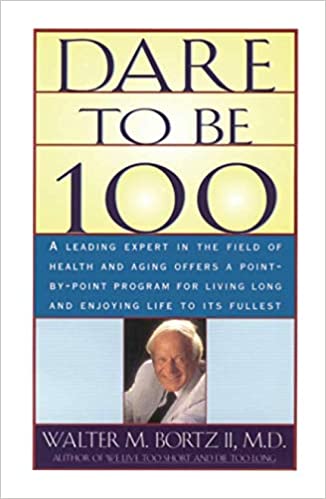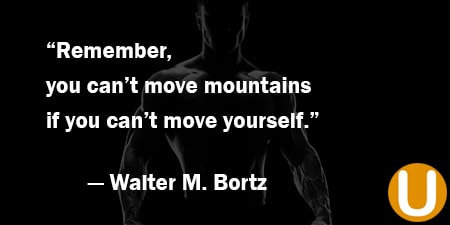Dare to Be 100 Summary
- Book by Walter M. Bortz II, M.D.
The Book in 1 Sentences
Dare To Be 100: 99 Steps To A Long, Healthy Life
“Within this book I intend not only to defend the idea of living to 100, but also to propose the active strategies that will make it happen. As someone wise once noted, “If you are going to get old, you might as well get as old as you can get.”
The title of this book is an acronym for the steps you need to take to reach 100: D for diet, A for attitude, R for Renewal (rest, recreation, retirement, resilience), E for exercise.
Three of these components—D, R, and E—are the biological compass points for aiming for 100, but A—attitude—is the most important. Within attitude lie all the planning and decision making that facilitate the biological steps. It is possible to reach 100 by chance, but it’s not likely.” ~ Walter M. Bortz II, M.D.
5 BIG Ideas
1. Heredity has little to do with how long you live.
2. Flow occurs mostly at work, much less during leisure.
3. The ultimate challenge of anyone’s life is the opportunity to make the most of it that can be made.
4. Studies have shown that connected people have less than half the mortality rates as lonely people.
5. The secret to reduce stress is to welcome it, work with it, and use its energy and challenges to make your life better.
Dare to Be 100 Summary
1. Is longevity determined by genetics?
The short answer is “NO” …
Dr. Bortz says: “If I, and you, have heard it once, we have it heard it a thousand times. “If you want to live to a ripe old age, be sure to choose old grandparents.” Cute, but wrong.
Heredity has little to do with how long you live. Many scientific studies, including those which study longevity records of twins, conclude that inheritance has only 15 to 20 percent to do with how long you will live. In other words, “It’s not the cards you’re dealt that matter most, it’s how you play your hand.””
So, don’t blame your genes for that! It’s more about what you do in your life to get to 100 and beyond…
2. The Paradox of Work
“Csikszentmihalyi found that we achieve flow when we are working at a challenging mental or physical task. In measured experiments, it’s been determined that flow occurs mostly at work, much less during leisure.
These experiments show that 54 percent of work time is spent in some degree of flow, 16 percent in boredom. At leisure, however, the reverse is true. You are in flow only 18 percent of the time, while 50 percent is dull and apathetic.
Despite this clear distinction, many judge the leisure part of their lives as pleasurable. This observation, repeatedly confirmed, is called the paradox of work, which is specific to humans.”
This is weird, isn’t it?!
We feel more alive when we are working on something… When our skills meet a challenge… It’s true.
Work and Love!
Csikszentmihalyi says in his book Flow: “Thus we have a paradoxical situation: On the job people feel skillful and challenged, and therefore feel more happy, strong, creative, and satisfied.
In their free time people feel that there is generally not much to do and their skills are not being used, and therefore they tend to feel more sad, weak, dull, and dissatisfied. Yet they would like to work less and spend more time in leisure.”
He also says: “Because work is so universal, yet so varied, it makes a tremendous difference to one’s overall contentment whether what one does for a living is enjoyable or not.
Thomas Carlyle was not far wrong when he wrote, ‘Blessed is he who has found his work; let him ask no other blessings.’ Sigmund Freud amplified somewhat on this simple advice. When asked his recipe for happiness, he gave a very short but sensible answer: ‘Work and love.’”
“You need to ensure that each minute of your life is crowded with active participation. It is simply the way nature works, and you need the guts to reach for your natural capacity.”
Wanna enjoy your life to the MAX? GET ENGAGED WITH IT… Seek activities that challenge and inspire you every day…
Will you?
That takes us to another big idea…
3. The First Key to Longevity
“Of all the longevity prescriptions offered by the centarians, work was number one.
... In general, centarians disregard advice to take it easy... As discussed earlier, work seems to be a biological necessity. Eighty-nine percent of centarians report having worked hard during their lives.
Only 10 out of 1,200 had “easy lives.” Only those who disregard the advice to slow down lived to 100. Seven percent worked over 90 years, 92 percent worked over 60 years. Only 3 1/2% retired at age 65.”
So, now you know the first and most important key to longevity… It’s “WORK”!
You know what?!
You have a gift to give to the world... Find it! Find your WHY! Engage with it… Work and love what you’re doing…
That’s the first key to longevity… 🙂
4. Re-wire your Brain!
“A recent New York Times report on peak performance noted that world-class violinists practice twice as much as nationally acclaimed violinists, who practice twice as much as local violinists. Such a relationship holds for chess masters as well.
Directed effort, planning, and practice makes the performance; the performance makes the person. In his book The Mind’s Sky, Timothy Ferris of UC Berkeley has a chapter titled “Joe Montana’s Prefrontal Cortex.”
Ferris estimates that the development of a portion of Joe’s brain associated with throwing the fifteen-yard down-and-out pass is extraordinarily developed. In the days before the last of Bill’s Super Bowl’s I watched Steve Young throw sideline passes over and over to receiver Jerry Rice long after the others had gone to the dressing room.
Similarly, Marian Diamond showed that the association and computation part of Einstein’s brain was hypertrophied, like a weight lifter’s biceps.”
Ever heard about the idea of “Re-wiring your brain”?
It’s actually a true concept…
Brain is like a muscle; you can train it to be more intelligent on whatever you’re doing!
So, it’s not only about having a talent anymore… You can use your brain and grow it…
If you wanna know more about this topic you can read The Talent Code and Talent Is Overrated.
Walter also says that “Most of the changes commonly associated with old people are really not dependent on the passage of time; they result mostly from disuse.”
That’s it… Use your brain or you’ll lose it!
5. The Belief in 100
“The most important step is the first. A journey of a hundred miles or years begins not with the first movement forward, but with the thought that precedes it. “The belief in 100” is so important because you are moldable, shapable like clay under a sculptor’s hands—yours.
The ultimate challenge of anyone’s life is the opportunity to make the most of it that can be made. “To thine own self be true” becomes “to thine own best self be true.” Who you get to be—how old, wise, competent, creative, sexy, fun you become—depends on how you plan.
Decrepitude and loss are not predetermined. How you... set your course is highly predictive of the journey you will take.”
Can you reach something that you believe it doesn’t exist?!
Absolutely Not...
So, it’s really important to believe in 100 in order to reach it! It’s as equally important that you believe you can be healthy, wise, creative… etc at 100
Do you believe that?
If you wanna reach it you gotta believe it…

GET Blinkist 7 Days FREE Trial
3000+ Book Summaries
(Audio and Text)
6. Connect with People
“Studies have shown that connected people have less than half the mortality rates as lonely people, and the closer the relationships, the more powerful the survival effect.
Living alone is bad for your heart, bad for your immunity, bad for your mind. The key to keeping laboratory rats alive is not nutritional nor medical care, but the simple availability of TLC. Old rats live substantially longer merely because they are caressed. It sounds good to me.”
To enjoy our lives, to boost our happiness and live longer we need company.
We need to belong!
Jonathan Haidt tells us in his great book The Happiness Hypothesis: “If you want to predict how happy someone is, or how long she will live (and if you are not allowed to ask about her genes or personality), you should find out about her social relationships.
Having strong social relationships strengthens the immune system, extends life (more than does quitting smoking), speeds recovery from surgery, and reduces the risks of depression and anxiety disorders.
It’s not just that extroverts are naturally happier and healthier; when introverts are forced to be more outgoing, they usually enjoy it and find that it boosts their mood.
Even people who think they don’t want a lot of social contact still benefit from it. And it’s not just that “We all need somebody to lean on”; recent work on giving support shows that caring for others is often more beneficial than is receiving help.
We need to interact and intertwine with others; we need the give and the take; we need to belong. An ideology of extreme personal freedom can be dangerous because it encourages people to leave homes, jobs, cities, and marriages in search of personal and professional fulfillment, thereby breaking the relationships that were probably their best hope for such fulfillment.”
Don’t ever underestimate the power of having good relationships.
So, get out there and have some fun 🙂
7. Stress Antidotes
“Any life of value will have bucketsful of potential stress producers; the secret to stress is to welcome it, work with it, and use its energy and challenges to make your life better...
The most central ingredient in building a familiarity with dealing with stress is perspective. If you view every miniature departure from the routine as a threat of major consequence, then you’re in for tough going.
Stress expert Dr. Robert Eliot advises two things: “First, don’t sweat the little things, and second, everything is a little thing.” It is always a kick to think back a year or so and identify the things that were keeping us awake at night. Almost invariably, they have melted into non-significance.
Other stress antidotes are good—strong health and a positive outlook counteract stress. It is important, too, to look stress in the eye. Pretending that a big bill, an overdue doctor’s or dental visit, or a family conflict doesn’t exist makes resolution very tough. Relaxation skills and a sense of humor help. Exercise is also a terrific stress reducer.”
Bortz also says: “The chart may read heart problems or stroke, but the real culprit is often stress.”
How to deal with stress?
Dale Carnegie gives tells us in his great book How to Stop Worrying and Start Living: “Seventy per cent of all patients who come to physicians could cure themselves if they got rid of their fears and worries.”
And he also tells us about how he deals with stress: “Experience has proved to me, time after time, the enormous value of arriving at a decision. It is the failure to arrive at a fixed purpose, the inability to stop going around and round in maddening circles, that drives men to nervous breakdowns and living hells. I find that fifty per cent of my worries vanishes once I arrive at a clear, definite decision; and another forty per cent usually vanishes once I start to carry out that decision.
So, I banish about 90 per cent of my worries by taking these four steps:
1. Writing down precisely what I am worried about.
2. Writing down what I can do about it.
3. Deciding what to do.
4. Starting immediately to carry out that decision.”
And always remember that “Of all your resources, your health is your most precious—more precious than your money, your house, your friends.”
And also remember what Tony Robbins says: “Ten years from now you’ll laugh at whatever’s stressing you out today. So why not laugh now?”
8. Physical Exercise is the First Line of Defense
“Major changes in brain chemistry accompany depression. This is where antidepressant medicines come in. The use of antidepressant medicine for the depressed person is like the use of insulin for a diabetic—it’s an effort to repair a chemical deficiency, and it works!
But before quickly resorting to the prescription pad, I have always advocated physical exercise as the first line of defense—or maybe offense. As an antidepressant, exercise has sturdy credentials.
Each bout of sweating is accompanied by a surge in the production of body molecules called catecholamines, commonly known as adrenalin. These same compounds are not found in abundance in the nervous system of depressed people.
Exercise, too, has been shown to raise the levels of the upper-compound endorphins, which accompany euphoria and immunize against pain. These endorphins are probably behind the acknowledged addictive quality of exercise.”
Exercise is a natural antidepressant
Exercise is a natural antidepressant. And it also can PROTECT you from being depressed… It literally alters your body chemistry!
So, are you exercising? 🙂
Bortz says that “An adequate physical exercise program requires no more than 3 hours out of 168, only 2 percent of the week’s time. Three hours of life can be gained for every hour spent exercising—a good bargain, no?”
Easy and achievable, isn’t it?
Bortz also tells us that “The tremendous value that physical exercise provides to your body is established beyond any reasonable doubt. Dr. Bob Butler said, “If there was a drug that provided all the benefits that exercise does, the whole world would be taking it.” Of course, there is no such drug; the value of exercise must come from an activity program of your own devising and accomplishment. You cannot delegate exercise, and you can’t get something for nothing.”
9. It's Now a Matter of Choice
“Until recently, fate had decreed that you would die around age 70. Now, with the identity of elements that contribute and shape your whole life, you can track and control your biomarkers. Matters of fate have become matters of choice... Dare to be 100.”
So, do whatever it takes to be active, stress-free, happy, connected with others… Have big goals and sense of purpose… and GO ROCK IT till you reach 100 and beyond! 🙂
That was my Dare to Be 100 summary, a very quick look at this great book. This book is for everyone wants to live longer and happier! If you haven’t read it yet and you’re interested in it, get a copy. There is a HUGE amount of wisdom and value in this book, and we’ve only touched on a tiny bit of it.
Buy The Book: Dare to Be 100 by Walter M. Bortz

GET Blinkist 7 Days FREE Trial
3000+ Book Summaries
(Audio and Text)






